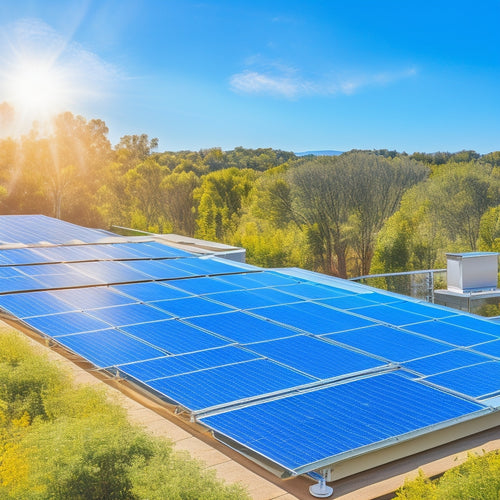
Testing Solar Panels for Corrosion Resistance: A Guide
Share
You're about to start on an important mission: ensuring your solar panels can withstand corrosive forces. Corrosion occurs at material interfaces, and humidity accelerates the process. To test corrosion resistance, you'll need to simulate real-world conditions using standardized tests like saltwater immersion and coating evaluations. You'll also need to assess environmental factors like temperature and radiation. By understanding corrosion in solar panels, you'll be able to design a rigorous testing program. From testing methods to interpreting results, you're about to uncover the secrets to predicting solar panel lifespan - and it all starts here.
Key Takeaways
• Standardized tests simulate real-world conditions to evaluate corrosion resistance in solar panels.
• Accelerated life testing procedures predict solar panel lifespan under accelerated conditions.
• Environmental factors like humidity, temperature, and radiation impact corrosion resistance in solar panels.
• Thorough data analysis considers temperature, humidity, and exposure time for accurate corrosion resistance assessment.
• Coating quality and material selection significantly influence corrosion rates in solar panels.
Understanding Corrosion in Solar Panels
When you examine the internal components of a solar panel, you'll find that corrosion can occur at the interface of dissimilar materials, such as the junction of the anodized aluminum frame and the stainless steel clamps. This corrosion can lead to a significant reduction in the panel's efficiency and lifespan.
Material selection plays an important role in minimizing corrosion, as certain materials are more prone to corrosion than others. For instance, using materials with similar corrosion rates can help reduce the risk of corrosion.
Humidity effects also play a vital role in corrosion, as moisture can accelerate the corrosion process. In coastal or high-humidity environments, the risk of corrosion increases, making it essential to take into account the environmental conditions when selecting materials.
Coating performance is another key factor, as a high-quality coating can provide an additional layer of protection against corrosion. A well-designed coating can greatly improve panel durability, ensuring that the solar panel operates at peak levels throughout its lifespan.
Testing Methods for Corrosion Resistance
To evaluate the corrosion resistance of solar panels, you'll need to implement standardized testing methods that simulate real-world environmental conditions. These tests assess the panel's ability to withstand corrosive substances, extreme temperatures, and humidity.
One such method is saltwater immersion, where the panel is submerged in a saltwater solution to replicate coastal environments. This test helps identify any weaknesses in the panel's coating or seals.
Another essential testing method is coating evaluation, which involves inspecting the panel's protective coating for defects or degradation. This can be done through visual inspections, adhesion tests, or electrochemical impedance spectroscopy. The goal is to verify the coating effectively shields the underlying materials from corrosive agents.
Accelerated Life Testing Procedures
You'll employ accelerated life testing procedures to simulate years of environmental exposure in a matter of weeks or months, thereby predicting the long-term corrosion resistance of solar panels. This approach enables you to evaluate the performance of solar panels under controlled, accelerated conditions, which would take years to occur naturally.
Here are some key considerations for accelerated life testing procedures:
-
Test Chamber: You'll need a specialized test chamber to control temperature, humidity, and other environmental factors that contribute to corrosion.
-
Test Cycles: Define test cycles that simulate real-world environmental exposure, such as extreme temperatures, humidity, and UV radiation.
-
Failure Analysis: Conduct a thorough failure analysis to identify the root cause of corrosion and determine the effectiveness of corrosion protection measures.
- Data Analysis: Collect and analyze data to quantify the corrosion resistance of solar panels and predict their lifespan.
Environmental Factors Affecting Corrosion
Environmental factors, including temperature, humidity, and radiation, play a significant role in corrosion, and understanding their impact is vital for predicting the lifespan of solar panels.
When testing solar panels for corrosion resistance, it's important to take into account the environmental factors that can accelerate corrosion. You'll want to examine the effects of humidity exposure, which can lead to moisture penetration and electrochemical reactions that facilitate corrosion.
Temperature fluctuations also play a significant role, as they can cause thermal expansion and contraction, leading to mechanical stress and increased corrosion susceptibility.
When evaluating the corrosion resistance of solar panels, you should consider the combined effects of these environmental factors. For instance, high temperatures can enhance the corrosive effects of humidity, while radiation can alter the surface chemistry of the panel, making it more susceptible to corrosion.
Interpreting Test Results and Standards
Interpreting Test Results and Standards
When interpreting test results, accurately distinguishing between superficial and deep corrosion is crucial, as it greatly impacts the overall assessment of a solar panel's corrosion resistance. You must carefully analyze the data to identify the type and extent of corrosion. This involves a thorough examination of the test results, including visual inspections, weight loss measurements, and electrochemical tests.
To guarantee accurate interpretation, follow these guidelines:
-
Data Analysis: Conduct a thorough analysis of the test data, considering factors such as temperature, humidity, and exposure time.
-
Regulatory Framework: Familiarize yourself with relevant standards and regulations, such as IEC 61215, to ensure compliance.
-
Visual Inspection: Perform a detailed visual examination of the solar panels to identify signs of corrosion, such as rust, scaling, or pitting.
- Corrosion Classification: Categorize the corrosion as superficial or deep, based on the severity and extent of the damage.
Frequently Asked Questions
Can Non-Accelerated Testing Methods Be Used for Corrosion Resistance Testing?
You can opt for non-accelerated testing methods, mimicking real-world scenarios, to evaluate corrosion resistance. This approach considers environmental factors, such as temperature and humidity, to provide more accurate results.
Are There Any Industry-Recognized Standards for Corrosion Testing Equipment?
You'll find that industry-recognized standards for corrosion testing equipment exist, such as ASTM B117 for salt spray testing, which considers environmental factors, testing protocols, and certification bodies, ultimately influencing material selection.
How Often Should Solar Panels Be Inspected for Corrosion Signs?
You should inspect solar panels regularly, ideally every 6-12 months, considering environmental factors like humidity, saltwater exposure, and extreme temperatures, to guarantee early detection of corrosion signs and maintain peak performance through regular maintenance.
Can Corrosion-Resistant Coatings Be Applied to Existing Solar Panels?
You can consider recoating existing solar panels, but it's important to assess the recoat feasibility and panel refurbishment requirements, ensuring the new coating adheres properly and doesn't compromise the panel's electrical performance.
Are There Any Solar Panel Materials More Prone to Corrosion Than Others?
When selecting materials for your solar panels, you'll find that some are more prone to corrosion than others, with aluminum frames and copper wires being particularly vulnerable due to their high corrosion vulnerability, making material selection essential.
Related Posts
-

What Types of Solar Energy Devices Are Available
You'll find several types of solar energy devices available today, each customized to different energy needs. Photovo...
-

Sustainable and Eco-Friendly Generators for a Reduced Carbon Footprint
Sustainable and eco-friendly generators are perfect for cutting your carbon footprint and increasing energy efficienc...
-

Home Solar Installation Cost
You're considering installing solar panels on your home, and the upfront cost is likely the biggest hurdle standing i...


